► Stylish Velar is on our long-term fleet
► Ours is a P400e plug-in hybrid
► Is it more than just a pretty face?
I love the Velar, but its charging protocol is an unintuitive irritant.
I’ve timetabled charging just after midnight every day, operated by an infotainment tab saying the day/time. Tap that and you enter the complex scheduling page: I just want a standalone tab that reassuringly says TIMER ON alongside the CHARGE NOW tab.
Even when all seems set, I’ll plug in the Velar and the blue light (for timer) turns green and charging starts! So it’s back to the touchscreen, which sometimes can’t load the menu… I’d happily do it manually at bedtime with the app, but there’s no standalone START CHARGE function. Grrrr!
By Phil McNamara
Logbook: Range Rover Velar P400e S
Price £61,770 (£71,315 as tested)
Performance 1997cc turbocharged four-cylinder plus e-motor, 17.1kWh battery, PHEV, 398bhp, 5.4sec 0-62mph, 149mph
Efficiency 109.9mpg (official), 43.6mpg (tested), 49g/km CO2
Energy cost 3.4p per mile
Miles this month 254
Total miles 3648
Month 2 living with a Range Rover Velar hybrid: watt a difference
Fully charged
With petrol panic all around, hybrid assistance is brilliant for getting nearly 500 Velar miles per tankful. Electric’s great for around-town cruising, but how long will 31 miles of e-boost last on a more demanding trip?
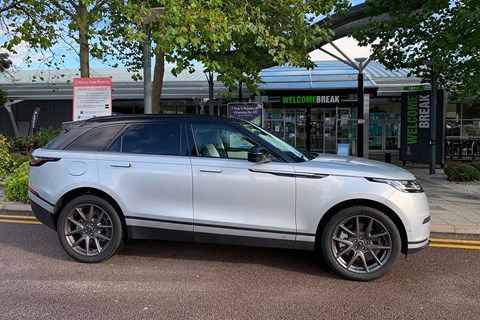
Herts Rectangle
Many enthusiasts will know the Evo Triangle, but my local test route is the Herts Rectangle. It encompasses some motorway, three towns and some of the county’s best A and B roads. The B556 to South Mimms’ high-speed, high-frequency bumps provides the first test, the Velar flowing like toffee sauce over a sticky pudding.
No-emissions zone
Into Potters Bar and I tap the EV lozenge on the lower touch panel, and the digital dials alter to show a target 1500rpm ‘rev ceiling’ to ensure zero-emissions running – a feat easily achieved with measured throttle, even when the pace picks up to 50mph. Then it’s the fast, twisty B158 to Hertford, and 20 miles in we’re averaging 48mpg – and have 17 e-miles remaining.
8 out of A10
At motorway speeds, there’s a little grumble from the 265/45 R21 all-season Michelins accompanied by some wind rustle, but the drivetrain is imperceptible. And with seats that feel a squidgy delight, the Velar cockpit is more chilled than a Caribou album.
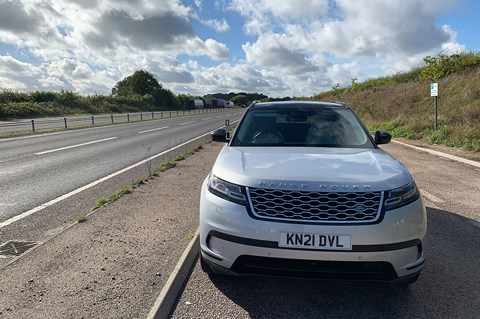
Sport mode vs A507
The A507 is the finest stretch. Gun it and the four-cylinder petrol engine growls, backed up by the 141bhp e-motor, for a punchy 472lb ft of combined torque. With Sport mode keeping the body tied down, plenty of grip and a direct front end, the 2.2-tonne SUV hauls itself competently over this route, much favoured by bikers on Sunday mornings.
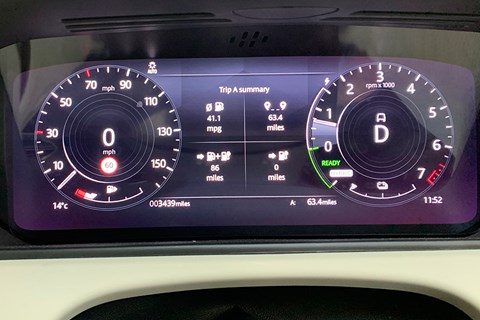
The reckoning
The Velar still agrees to 70mph pure electric running with only two miles of charge left, before the final watts run out just before the end of the 64-mile round trip. The trip computer claims 41mpg, the telemetry app 43.7 – either way, not bad. And the abiding memory is the smooth, unobtrusive transitions between this sophisticated hybrid’s power sources.
Logbook: Range Rover Velar P400e S
Price £61,770 (£71,315 as tested)
Performance 1997cc turbo four-cylinder plus e-motor, 17.1kWh battery, PHEV, 398bhp, 5.4sec 0-62mph, 149mph
Efficiency 109.9mpg (official), 64.2mpg (tested), 49g/km CO2
Energy cost 14.5p
Miles this month 576
Total miles 3394
Month 1 living with a Range Rover Velar hybrid: hello and welcome
To me, there’s something under-the-radar about the Velar. The stately Range Rover is an icon, the Sport a pushy extrovert, the stunning Evoque rightly ubiquitous. But the Velar? It’s the overlooked one, the Stephen Baldwin of the Range Rover family. So with great interest, we’ll get properly acquainted over the next eight months.
Our test car wears the P400e badge, denoting the new plug-in hybrid drivetrain. Up front there’s a 2.0-litre four-cylinder petrol engine, nuzzling up against a 105kW (139bhp) electric motor, with both power sources feeding all four wheels via an eight-speed automatic transmission.
The Velar PHEV musters 472lb ft of combined torque to spin those wheels, for a 0-62mph sprint in 5.4sec. Nice to have for the odd overtake, but my driving style focuses more on preserving the 31 miles of pure electric range from a full charge. That takes a couple of hours on my 7kW AC wallbox, or half an hour (to 80 per cent) on a 32kW public DC charger. I’m charging two or three times a week in a bid to maximise zero-emissions journeys.
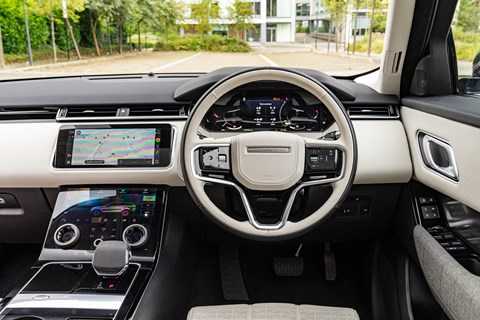
The battery is big for a hybrid: at 17.1kWh, it’s not far off the size of the base Fiat 500e’s. No surprise given the need to propel a 4.8m-long, near-2.2-tonne SUV on electricity alone. First impression is that the petrol engine switches in and out unobtrusively, though there’s an occasional hesitancy as the chips decide which motor will propel things as you get back on the accelerator. A common petrol-electric affliction.
Typically I’m just leaving the Velar in Hybrid mode, and most of my two-mile nursery round trips can be electric if driven steadily. There’s also a pure Electric mode (given sufficient charge) or a Save mode where the petrol power does the donkeywork and juices up the battery.
The PHEV model is second only to the P400 straight-six in the Velar pecking order. Base spec includes 19-inch alloys, Land Rover’s Terrain Response to alter all-wheel drivetrain settings, passive suspension, 3D surround camera and Apple CarPlay/Android Auto.
We’ve got the second-tier S trim which adds the ‘Pro’ version of JLR’s new Pivi infotainment (an inexplicable name; perhaps it’s Siri’s Peruvian cousin), plus premium headlamps, heated folding mirrors, powered front seats, a Meridian sound system, Traffic Sign Recognition and Adaptive Speed Limiter.
Nonetheless, our car has a few options to make it special; £9545 worth, in fact. The exterior looks fantastic in £760 Hakuba silver metallic with the £700 black roof to accentuate the cab-backwards proportions.
I went giddy for the textile interior the day I first saw it in Land Rover’s design studio, so the £1100 grey and oyster suedecloth upholstery was a must. Alas my kids don’t share this reverence, so I’ll be off to B&Q to buy plastic sheeting to put beneath the child seats. A £1350 glass roof bathes the cockpit in warm sunlight – occasionally.
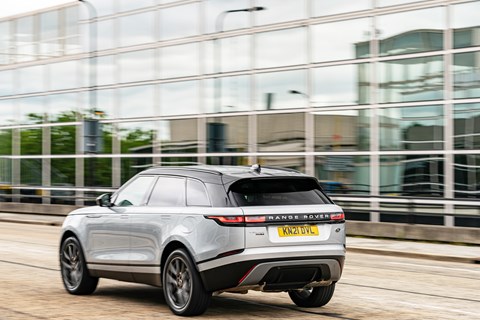
There are two very costly features: £1755 for Terrain Response 2, adaptive dynamics and All Terrain Progress Control (effectively low-speed cruise control for off-roading). And the Rangie has £2330 21-inch alloys – a size shared with my previous car, the Mercedes EQC, but the Velar’s supremely comfortable, superior ride is instantly noticeable.
Within days of arriving it carted the family off to Marlow for a family party, impressing with its serenity, spaciousness and blissfully comfortable seats. Fully charged for both motorway runs, the Velar averaged 44mpg, about 10 miles more than the diesel Evoque and Disco Sport I ran years back. What will fuel economy settle down to? Will Pivi Pro be as frustrating as previous JLR systems? And how much will I miss a pure EV? All will be revealed over the next eight months.
By Phil McNamara
Logbook: Range Rover Velar P400e S
Price £61,770 (£71,315 as tested)
Performance 1997cc turbocharged four-cylinder plus e-motor, 17.1kWh battery, 398bhp, 5.4sec 0-62mph, 149mph
Efficiency 109.9mpg (official), 59.5mpg (tested), 49g/km CO2
Energy cost 15.0p per mile
Miles this month 1197
Total miles 2818